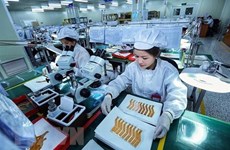Science-technology fuels Vietnamese coffee’s growth
The development of science-technology in coffee cultivation through
contributions from the Central Highlands Agriculture and Forestry
Science Institute (CASI) has helped Vietnam establish itself as the
world’s second largest coffee producer and top Robusta coffee exporter.
The development of science-technology in coffee cultivation through
contributions from the Central Highlands Agriculture and Forestry
Science Institute (CASI) has helped Vietnam establish itself as the
world’s second largest coffee producer and top Robusta coffee exporter.
CASI Director Dr Le Ngoc Bau said after 1975, when Southern Vietnam was liberated and the country was reunified, the Central Highlands had only 12,000 hectares of coffee trees with several hundreds of kilograms of beans per hectare.
The region is now home to more than 90 percent of Vietnam’s 635,000 hectares of coffee trees which generate 2.3-2.5 tonnes of beans every hectare and more than 1.5 million tonnes of beans every crop; a productivity that is currently 2.5-3 times higher than the global average, he added.
In 2014, Vietnam exported more than 1.7 million tonnes of coffee beans worth over 3.4 billion USD, ranking second in terms of export value after rice.
Bau said over the past decade, the CASI has focused its resources on researching key cultivation methods for seedling production, growing techniques, and low-yield tree improvement.
Between 2000 and 2010, the institute successfully created nine Robusta varieties, from TR4 to TR13, by cross-breeding and two Arabica varieties, TN1 and TN2. All of which were recognised by the Ministry of Agriculture and Rural Development, he noted.
The new Robusta varieties generate about 4.5-7.3 tonnes of beans per hectare every crop, 30 percent more productive than traditional varieties, with bigger beans (17-23 grams every 100 beans). Most importantly, they are highly capable of resisting the leaf rust (Hemileia vastatrix), a disease that can cause serious damage to coffee trees.
These varieties have been provided for local farmers to replace old ones, the Director added.
The CASI has also developed and instructed the use of effective watering and fertilising methods, techniques for other cultivation steps, and harvesting and processing technologies to farmers.
In the years ahead, his institute will continue developing high-yield and high-quality varieties and more effective growing techniques while conducting in-depth studies on coffee diseases and pests to help Vietnam’s coffee sector develop sustainably, Bau noted.-VNA
CASI Director Dr Le Ngoc Bau said after 1975, when Southern Vietnam was liberated and the country was reunified, the Central Highlands had only 12,000 hectares of coffee trees with several hundreds of kilograms of beans per hectare.
The region is now home to more than 90 percent of Vietnam’s 635,000 hectares of coffee trees which generate 2.3-2.5 tonnes of beans every hectare and more than 1.5 million tonnes of beans every crop; a productivity that is currently 2.5-3 times higher than the global average, he added.
In 2014, Vietnam exported more than 1.7 million tonnes of coffee beans worth over 3.4 billion USD, ranking second in terms of export value after rice.
Bau said over the past decade, the CASI has focused its resources on researching key cultivation methods for seedling production, growing techniques, and low-yield tree improvement.
Between 2000 and 2010, the institute successfully created nine Robusta varieties, from TR4 to TR13, by cross-breeding and two Arabica varieties, TN1 and TN2. All of which were recognised by the Ministry of Agriculture and Rural Development, he noted.
The new Robusta varieties generate about 4.5-7.3 tonnes of beans per hectare every crop, 30 percent more productive than traditional varieties, with bigger beans (17-23 grams every 100 beans). Most importantly, they are highly capable of resisting the leaf rust (Hemileia vastatrix), a disease that can cause serious damage to coffee trees.
These varieties have been provided for local farmers to replace old ones, the Director added.
The CASI has also developed and instructed the use of effective watering and fertilising methods, techniques for other cultivation steps, and harvesting and processing technologies to farmers.
In the years ahead, his institute will continue developing high-yield and high-quality varieties and more effective growing techniques while conducting in-depth studies on coffee diseases and pests to help Vietnam’s coffee sector develop sustainably, Bau noted.-VNA













